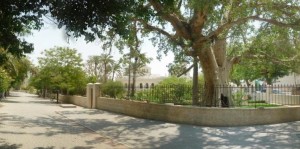He entered Jericho and was passing through. And there was a man named Zacchaeus. He was a chief tax collector and was rich . . . Luke 19:1-2
Loser.
That’s what they say about him, as well as, He’ll do anything for a mina, and He’d sell his grandmother for a day’s wages and, I wonder how he can sleep at night? He usually slept just fine—knowing from experience that empty stomachs stole more sleep than full ones, and goose down suited his bones better than stale straw.
And yet there has to be something missing in his comfortable life; why else would he respond with this thrill of excitement and urgency when he hears the news? “Jesus of Nazareth is right outside the city! He just healed a blind man—remember old Bartimeus who always begged in that same spot outside the wall? Yes, him—he’s walking beside the Rabbi and praising God!”
Not that anyone would directly tell Zacchaeus this. His few friends seldom hang around the collecting table, but are more likely to show up in the evenings when he is taking dinner at the tavern and might be persuaded to buy them a drink. Zacchaeus picks up the news while walking to the market where his boy Tobias is supposed to be setting up. The air is full of news; he plucks bits and pieces like blowing blossoms. “He’s just entered the gate!” “He’s on the way to the market!” “I wonder where he’s staying?”
The tax collector’s mind, previously packed with accounts and balances and cuts, blows clear. He has to see this man. Previous reports, however intriguing, are just talk; this is the man himself—Messiah they say, less than half a mile away. Everyone is going to see him.
Me too, he thinks. I must, must, must—
It’s been years since he ran like that. All are hurrying, but he runs—robes tucked up, moneybag close to his chest, fine sandals flapping, it doesn’t take long to reach the mob that carries the man inside it, but he can’t see. Even women block him.
(His small size, they whisper among themselves, accounts for his small heart.)
So near, yet so far—but then an idea pops in his head. Turning sideways he works his way around the perimeter of the mob and hits the ground running. Always figuring out a way to get ahead, that’s him. He even has a tree in mind: the old sycamore just outside the market entrance where the women like to gather. They are all off to see the parade, so the ground is clear when he charges the tree full-tilt, leaps for its lowest branch and uses his own momentum to swing himself up. Climbing higher, he finds a steady perch and leans out, panting. Not bad, for a middle-aged respectable merchant. A perfect view, and no one will notice him.

Now he can see for himself who this Jesus is. Too bad there are no blind beggars about . . . He’d pay good money to see such a miracle . . . And here they come! First children, skipping and singing, then strangers clearing the way—the man’s followers, he suspects—and then the man himself, a steady presence in all the tumult. Zacchaeus recognizes him immediately yet wonders why, because there is nothing especially noteworthy to catch the eye: average height, average looks, average build, ordinary clothes. What is it about him?
While Zacchaeus is trying to figure this out, the man stops. And looks up into the tree. And sees him.
Here’s what it is about him: a lightness, a spaciousness, somehow contained in a personality both massive and majestic. And also, somehow . . . merry? As though the two of them share a joke. And the joke is, Zacchaeus doesn’t feel self-conscious at all. He is only conscious of the man . . . who knows his name!
“Zacchaeus,” the man says. “What are you doing up there? Come down—I’m staying with you today.”
The ten-year-old he once was could not have scrambled down any faster. The little man bows, snaps his fingers, sends a boy to the house to tell the servants to get ready. The murmurs begin at his back—not only from the prominent but also from the plain. He barely hears them. By the time they reach his house Jesus has his whole life story. As they walk through the gate, Jesus has his heart. And as they pass through the courtyard, Jesus has it all.
“Look, Lord.” The loser pauses at the door. “Half of all my goods I give to the poor. And anyone I’ve defrauded I’ll pay fourfold.”
The followers look at each other, remembering another rich man who couldn’t give it up. Is this man serious? Obvious a shady character, a slippery sort—everyone knows the type. Could the Master see through him?
No, the Master sees him.
___________________________________________
For the original post in this series, go here.
<Previous
Next>



